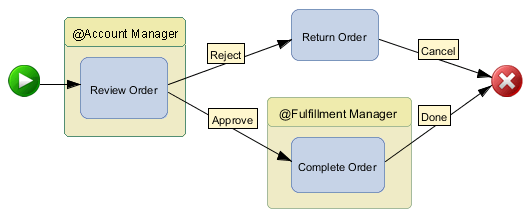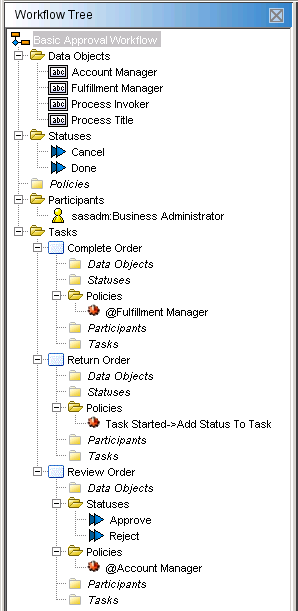Basic Approval Workflow
The Basic Approval Workflow template illustrates one type of alternate flow control
where only a single path is taken based on the completion status of the previous task. This workflow is initiated when the system receives an order. Then, an account manager must access
the relevant ordering system, review the order details, and either approve or reject
the order. If the order is rejected, then it is returned by the system. If the order
is approved, then a fulfillment manager must complete the order.
Basic Approval Workflow Diagram

This workflow uses the Exclusive Choice workflow pattern.
The following figure
shows the workflow tree for the Basic Approval Workflow.
Workflow Tree for the Basic Approval Workflow

The following table
provides details about the elements of the Basic Approval Workflow:
|
Element Name
|
Element Type
|
Details
|
|---|---|---|
|
Process Invoker
|
Data Object
|
Default data object of type Short Text defined for all templates. Holds the user name of the person who
starts an instance of this workflow.1
|
|
Process Title
|
Data Object
|
Default data object of type Short Text defined for all templates. Holds the title
for the workflow instance.1
|
|
Account Manager
|
Data Object
|
Data object of type Short Text defined for all instances. Holds the group name used
by the @Account Manager swimlane policy.1
The default value is
US Region Accountants.
|
|
Fulfillment Manager
|
Data Object
|
Data object of type Short Text defined for all instances. Holds the group name used
by the @Fulfillment Manager swimlane policy.1
The default value is
US Region Supply Managers.
|
|
Cancel
|
Status
|
Default status value
defined for all templates.2
|
|
Done
|
Status
|
Default status value
defined for all templates.2
|
|
sasadm
|
Participant
|
This is a User type participant assigned to the root level and each task with the
workflow role of Business Administrator. This is a default SAS administrator user
configured
with the platform in the SAS Authorization Service.
The Business Administrator role supports certain administrative tasks such as adding
comments, delegating or transferring the task, or releasing the task locked by another
user.
|
|
Review Order
|
Task
|
This is a manual task that represents the user interacting with the system. Once the
user completes the
review and submits the relevant status, the relevant status is assigned when this
task completes. The next task is selected based on the status value as assigned to
the transition.
|
|
@Account Manager
|
Policy/Swimlane
|
The swimlane corresponds to a group participant defined in the workflow data object
Account Manager. The value in the data object is assigned at run time using this
policy. Only users who are members of this group can review orders. The group is an
implicit
value. Therefore, the value assigned to the data object must exist as a group in the
SAS Authorization Service.
For example, the default value is US Region Accountants. When starting a workflow
instance, an initial value must be made for this data object. Otherwise, there must
be a group defined with that name in the SAS Authorization
Service.
Because the workflow role assigned is Potential Owner, any user from that group can
claim the task. Once it is claimed, the user becomes the Actual Owner, the task is
locked, and no
others users can perform the task.3
|
|
Approve
|
Status
|
Status value defined
for Review Order.4
|
|
Reject
|
Status
|
Status value defined
for Review Order.4
|
|
Return Order
|
Task
|
This is a system task (that is, automated task) that initiates if the order is rejected.
Once completed,
the workflow instance ends with a status of Cancel because this task transitions to
the terminate node.
|
|
Workflow Started
->Add
Status to Workflow
|
Policy
|
This policy assigns the Cancel status because it is an automated task (that is, is
not explicitly performed like the previous manual task). This status
value stops the Return Order task and triggers the final transition into the terminate
node.
|
|
Complete Order
|
Task
|
This is a manual task that represents the user interacting with the system. This task
starts if the order
is approved. Then, the workflow instance ends with a status of Done because this task
transitions to the terminate node.
|
|
@Fulfillment Manager
|
Policy/Swimlane
|
The swimlane corresponds to a group participant defined in the workflow data object
Fulfillment Manager. The value in the data object is assigned at run time using this
policy. Only users who are members of this group can complete orders. The group is
an implicit
value. Therefore, the value assigned to the data object must exist as a group in the
SAS Authorization Service.
For example, the default value is US Region Supply Managers. If an initial value assignment
is not made for this data object when starting a workflow instance, there must be
a group defined with that name in the SAS Authorization Service.
Because the workflow role assigned is Potential Owner, any user from that group can
claim the task. Once it is claimed, the user becomes the Actual Owner, the task is
locked and no
others users can perform the task.3
|
| 1This data object value is defined at the root level. This allows access to the value by decisions and policies at run time by all contained tasks and subflows. However, the value is not accessible as a local copy of the data object. | ||
| 2This status value is defined at the root level. This allows access to the value by decisions and policies at run time by all contained tasks and subflows. However, the value is not accessible as a local copy of the status. | ||
| 3Only users can be assigned to the Actual Owner workflow role. Participants of a SAS platform authorization group or role type must be assigned as Potential Owner and their user members must claim the task to become Actual Owner. | ||
| 4This status value is defined at the task level. This allows access to the value by decisions and policies at run time by all contained tasks and subflows. However, the value is not accessible as a local copy of the status. | ||
Copyright © SAS Institute Inc. All Rights Reserved.
Last updated: March 5, 2020